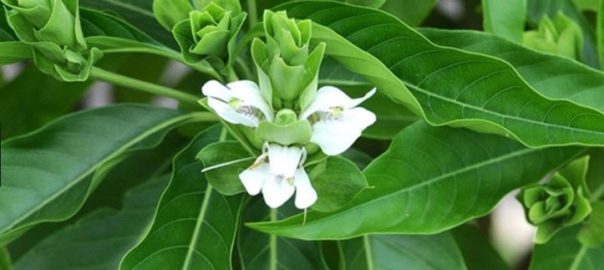
Natural Extracts
Adhatoda Vasica
| Botanical Name : ADHATODA VASICA Family Name : ACANTHACEAE Common Name : MALABAR NUT Part Used: Leaves, whole plant Habitat: The plant grows in plains & in lower Himalayan ranges upto 1000 m above sea level |
| ADHATODA VASICA ( VASAKA, MALABAR NUT, ADULSA ) | |
| PRODUCT CODE: | NE/ AV/ 008 |
| DESCRIPTION | LIGHT BROWN COLOURED POWDER WITH SLIGHTLY BITTER TASTE |
| IDENTIFICATION | ALKALOIDS BY T. L. C. |
| SOLUBILITY IN WATER IN 50% V/V ALCOHOL | 80% MIN. 80% MIN. |
| ASSAY ALKALOIDS | 0.5% MIN. |
Description : Adhatoda vasica is a small evergreen plant, of the Acanthaceae family, with broad, lanceolate (sharp and pointed like a lance) leaves measuring 10 to 16 centimeters in length and 5 centimeters wide. They become greenish-brown when dried and have a bitter taste. They have a smell similar to strong tea. The wood of the stem is soft, and makes a great charcoal for gunpowder. The flower has large, attractive, white petals, streaked with purple on the lower lip. The fruit is a small capsule with four seeds.
Uses : Principle constituents of Malabur nuts are the several alkaloids present and chief principle being quinazoline alkaloid, vasicine. The leaves are rich in vitamin C and carotene and yield an essential oil. The shrub is the source of the drug, well known in indigenous systems of medicine for its beneficial effects, particularly in bronchitis. The leaves, flowers, fruits and roots are extensively used for treating cold, cough, whooping-cough, chronic bronchitis and asthma. It acts as a sedative-expectorant, antispasmodic and anthelmintic. It is a bronchial antiseptic, bronchodilator and expectorant.
The roots, leaves and flowers and active principles of the plant possess a number of pharmacological properties and are used in cough, chronic bronchitis, rheumatism, asthma and bronchial asthma.
- The leaves of Malabar nut are rich in vitamin C and carotene and yield an essential oil.
- The shrub is the source of a drug well known in indigenous systems of medicine for its beneficial effects, particularly in bronchitis.
- Its leaves, flowers, fruits and roots are extensively used for treating cold, cough, whooping cough, chronic bronchitis and asthma.
- The leaves are known to moderate the hypotensive activity, by lowering the blood pressure.
- They assist in conditions like uterine involution, menorrhagia (excessive menstural bleeding), post-childbirth hemorrhage and uterine stimulant activity.
- The fresh juice obtained from leaves of Malabar nut has been used to treat tuberculosis. Its local use gives relief from pyorrhea and bleeding gums.
- The leaves of this plant are, sometimes, also used as insecticides.
- Antispasmodic properties are also associated with the plant. It helps in easing pain.

